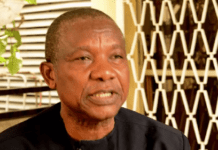As nations around the globe celebrate International Migrants Day on 18 December 2018, the World Health Organisation (WHO) has launched a technical guidance series on the health of refugees and migrants, in collaboration with the European Commission.
According to WHO’s release, each publication addresses a specific aspect of the health of refugees and migrants by providing tools, case studies and evidence to inform practices and policies to improve their health.

The Health Guidance series has five publications available presently, each with a special focus on one of the following:
Children’s health;
Health promotion;
Healthy ageing;
Maternal and newborn health; and
Mental health.
Commemorating the International Migrants Day in Nigeria, citizens have called on the government to latch on this noble initiative to better the lot of over 2 million Nigerians living in the Internally Displaced Persons’ (IDP) Camps across the country.
Available statistics revealed that there are IDP Camps in Lagos, Borno and Abuja, but the biggest are the camps in Maiduguri, located at : Arabic Teachers College (9,880 IDPs), Teachers Village (6,500 IDPs), National Youth Service Scheme Camp (6,611 IDPs) and Gubio (4,500 IDPs).
In the words Mallam Shehu Mohammed, a trader in Lagos, “If our government can discuss with other health institutions like WHO, UNICEF, others, on the health and welfare of these IDPs, I think things will not remain the same with them”.
Also Ayoola Kolade, a student residing in Lagos, urged the government to improve on its present allocations to the IDPs, while special monitoring of the funds and resources is key, as there are feelers about some unscrupulous agents diverting the meagre the resources given to the IDP Camps.
The Health Guidance for migrants and refugees reads in part:
Health of refugee and migrant children
When considering health and healthcare interventions for migrant children, areas that need specific attention include their diverse backgrounds, whether they are unaccompanied and separated from family, whether they have been trafficked, and whether they have been left behind.
This technical guidance presents policy considerations for promoting refugee and migrant children’s health and well-being, and particularly their mental health. It includes an intersectoral approach that targets risk factors at the individual, family and community levels. It emphasizes the important role of national/local governments in fostering or hindering equitable living conditions for refugee and migrant children in the areas of housing, health-care services and education.
Health promotion for improved refugee and migrant health
This technical guidance outlines current best practices, evidence and knowledge to inform policy and programme development in the area of health promotion for refugees and migrants in the WHO European Region. It highlights key principles, summarizes priority actions and challenges, maps available resources and tools, and provides policy considerations and practical recommendations to improve health promotion activities.
Health of older refugees and migrants
Population ageing caused by consistently low birth rates and increased life expectancy is a major current trend across Europe. This technical guidance aims to inform the development of policies and practices related to improving the health of older refugees and migrants.
Both ageing and migration are in themselves complex, multidimensional processes shaped by a range of factors over the life-course of the individual. Responding to the needs of older refugees and migrants, therefore, must be integrated into all dimensions of policies and practices related to ageing.
Improving the healthcare of pregnant refugee and migrant women and newborn children
Being a migrant can be considered a risk factor for poorer maternal and newborn health outcomes. This technical guidance identifies problems and entry points for interventions for maternal and newborn health among refugees and migrants in the Region.
Mental health promotion and mental healthcare in refugees and migrants
The complexity and stress of migration are related to events before departure, during travel and transit, and after arrival. Consequently, refugees and migrants can suffer from mental disorders, although prevalence is highly variable across studies and population groups.
This technical guidance reviews the prevalence of some disorders such as post-traumatic stress disorder and depressive and anxiety disorders. Based on the best available evidence regarding risk factors and areas for intervention, it identifies 8 priority action areas for consideration by policy-makers regarding the mental health of refugees and migrants.













